The Best 10 Alternatives to Azure VPN Gateway (+ Pricing & Reviews)
Twingate Team
•
•
Jul 27, 2024

Azure VPN Gateway allows secure connections to the cloud, enabling users to connect their on-premises networks to Azure. While it offers robust features, it might not be the choice for everyone. This article explores the benefits and limitations of using Azure VPN Gateway for secure cloud connections.
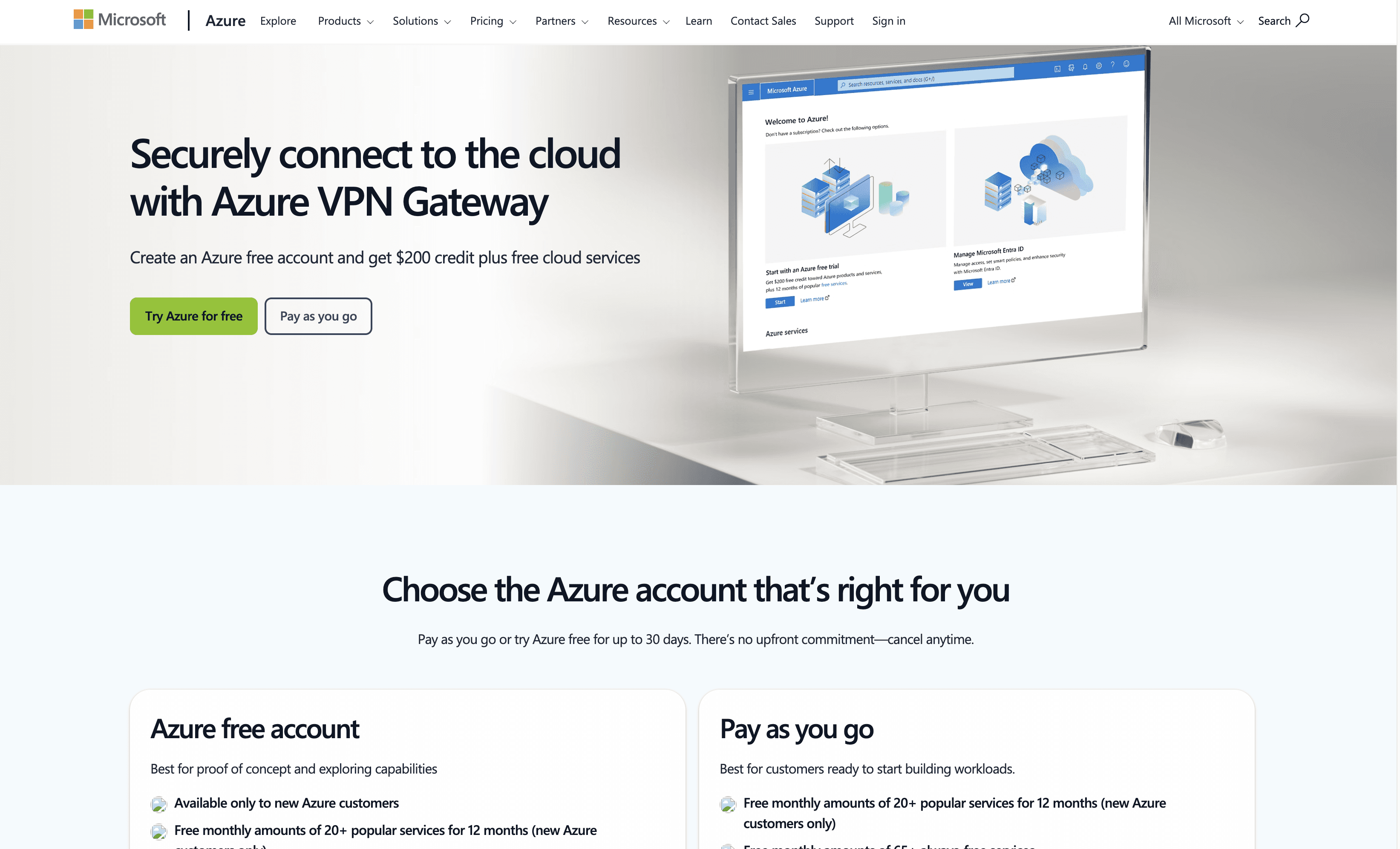
10 Alternatives to Azure VPN Gateway
1. Twingate
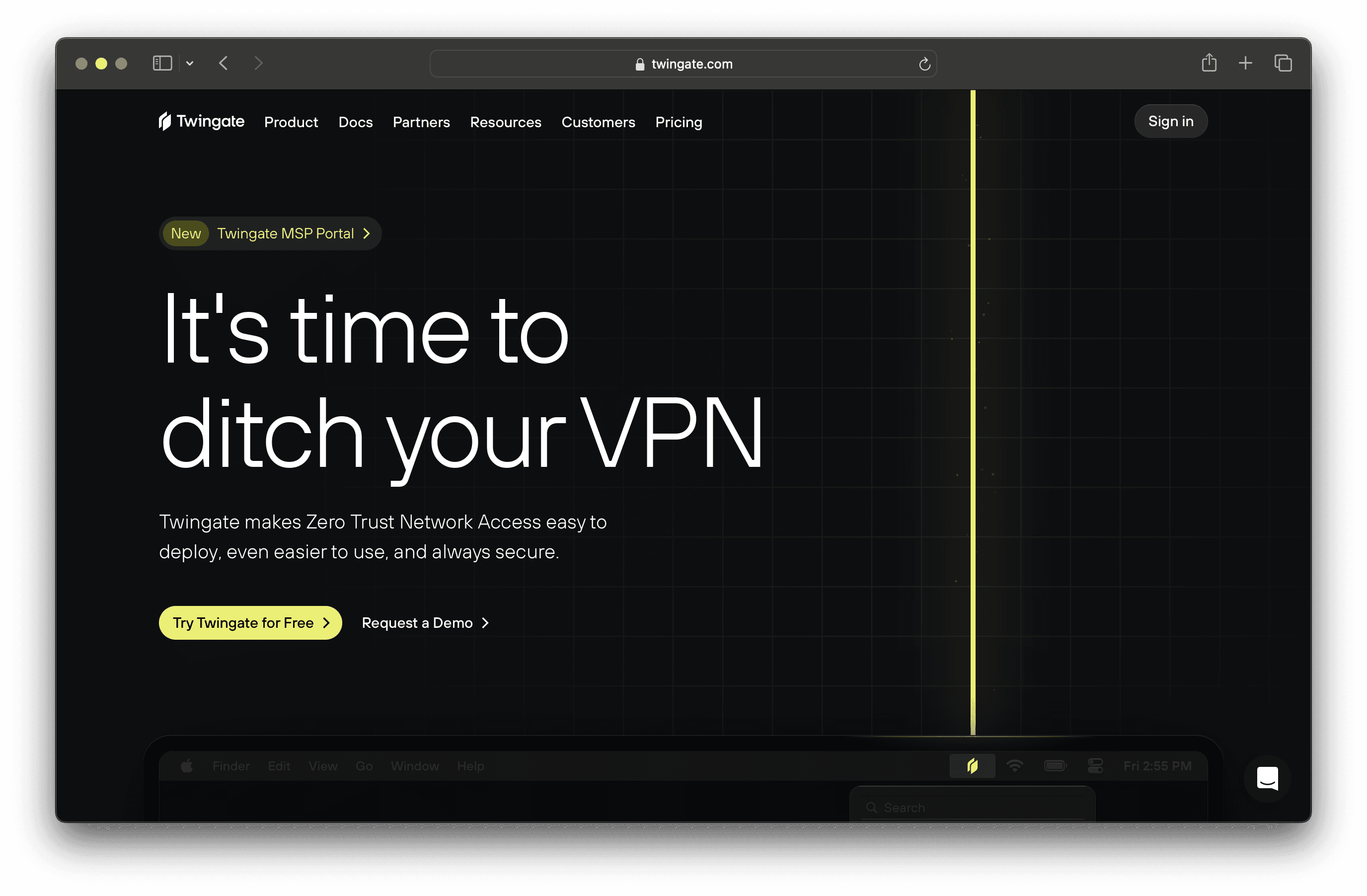
Twingate is a network security solution designed to replace traditional VPNs for remote access, offering a zero-trust security model and seamless deployment alongside existing infrastructure. With a focus on ease of use and scalability, Twingate aims to provide a secure and maintainable solution for businesses of all sizes.
Twingate Pricing
Starter: Free
Teams: $6 per user/month
Business: $12 per user/month
Enterprise: Custom pricing
Twingate Reviews
Twingate has an overall rating of 4.7 out of 5 stars based on 63 reviews. Users praise its ease of setup, high security, and excellent performance. Check out more of our reviews here!
Pros and Cons of Twingate
Pros:
Hardware Free: Eliminates challenging deployments and resource-intensive maintenance with software-based ZTNA.
Zero Trust Security: Prevents lateral network traffic, eliminates open inbound ports, and implements the principle of least privilege across the entire network.
Performant & Productive: Reduces IT support tickets and improves productivity for end users with best-in-class speed, reliability, and user experience.
Cons:
Initial Setup Complexity: While generally easy to set up, some users may find the initial configuration and integration with existing systems complex.
Learning Curve: There may be a learning curve for users unfamiliar with Zero Trust principles and ZTNA solutions.
Dependency on Internet: As a cloud-based solution, Twingate's performance and availability are dependent on internet connectivity.
2. CyberGhost
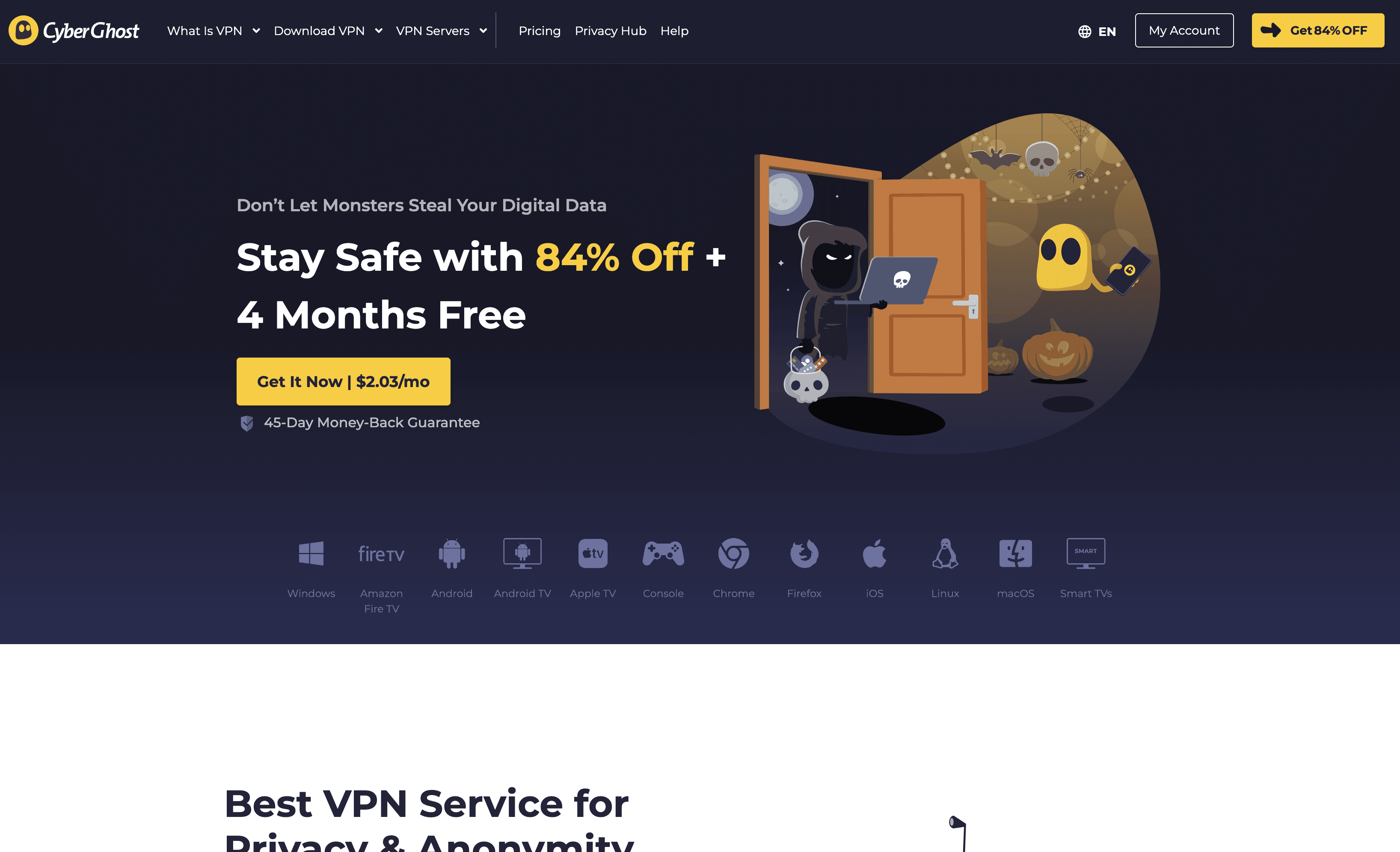
CyberGhost VPN is a service designed to enhance online privacy and security. It offers strong encryption, a no-logs policy, and access to a large server fleet. With features like split tunneling and dedicated IPs, CyberGhost aims to provide a secure and user-friendly VPN experience for all users.
CyberGhost Pricing
1 Month Plan: $12.99 per month
28 Month Plan: $2.03 per month
6 Month Plan: $6.99 per month
CyberGhost Reviews
CyberGhost has an overall rating of 4.5 out of 5 stars based on 20 reviews. Users praise its stability and security. Check out more of our reviews here!
Pros and Cons ofCyberGhost
Pros:
Complete Privacy: Connect up to 7 devices simultaneously with one subscription, ensuring all your gadgets are protected.
No Logs Policy: CyberGhost guarantees no tracking, sharing, or selling of user data, maintaining your anonymity.
Strong Encryption: Uses industry-leading encryption to hide your location and internet traffic from prying eyes.
Cons:
Access Issues: Some users report occasional difficulties accessing certain websites or services.
Limited Location Options: Despite a large server fleet, some regions may have fewer server choices.
Potential Speed Reduction: While generally fast, VPNs can sometimes slow down your internet connection.
3. Todyl
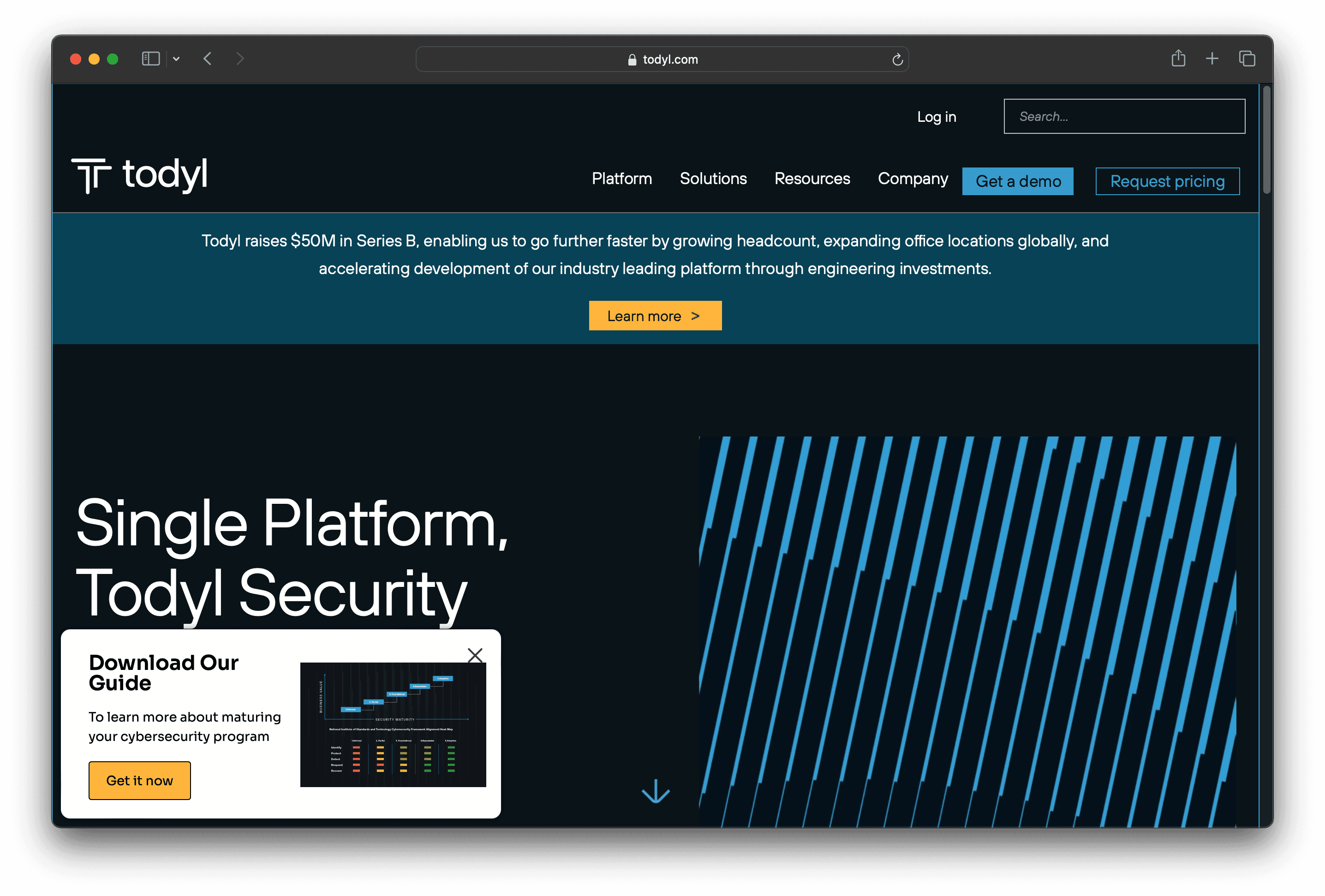
Todyl is a cybersecurity solution offering a modular and scalable approach to security. It consolidates multiple security capabilities into a single-agent platform, making deployment and management seamless. Todyl aims to provide comprehensive protection tailored to the specific needs of businesses, ensuring robust and adaptable security measures.
Todyl Pricing
Todyl's pricing is not public. Contact their support for more info.
Todyl Reviews
Todyl has an overall rating of 4.7 out of 5 stars based on 41 reviews. Users appreciate its comprehensive and integrated nature. Check out more of our reviews here!
Pros and Cons of Todyl
Pros:
Comprehensive and Customizable: Todyl offers a consolidated, customizable approach to cybersecurity, ensuring tailored protection for diverse business needs.
Single-Agent Platform: Streamlines deployments and optimizes operational overhead, reducing complexity and enhancing efficiency.
Modular Approach: Each module can be deployed independently, providing flexibility and scalability to meet specific security requirements.
Cons:
Complexity: The modular and customizable nature might require a steep learning curve for some users, potentially delaying full implementation.
Dependence on Single Platform: Relying on a single platform might pose risks if there are any platform-wide issues, affecting overall security.
Scalability Concerns: While scalable, businesses with very specific or niche needs might find limitations in Todyl's offerings.
4. Ivanti
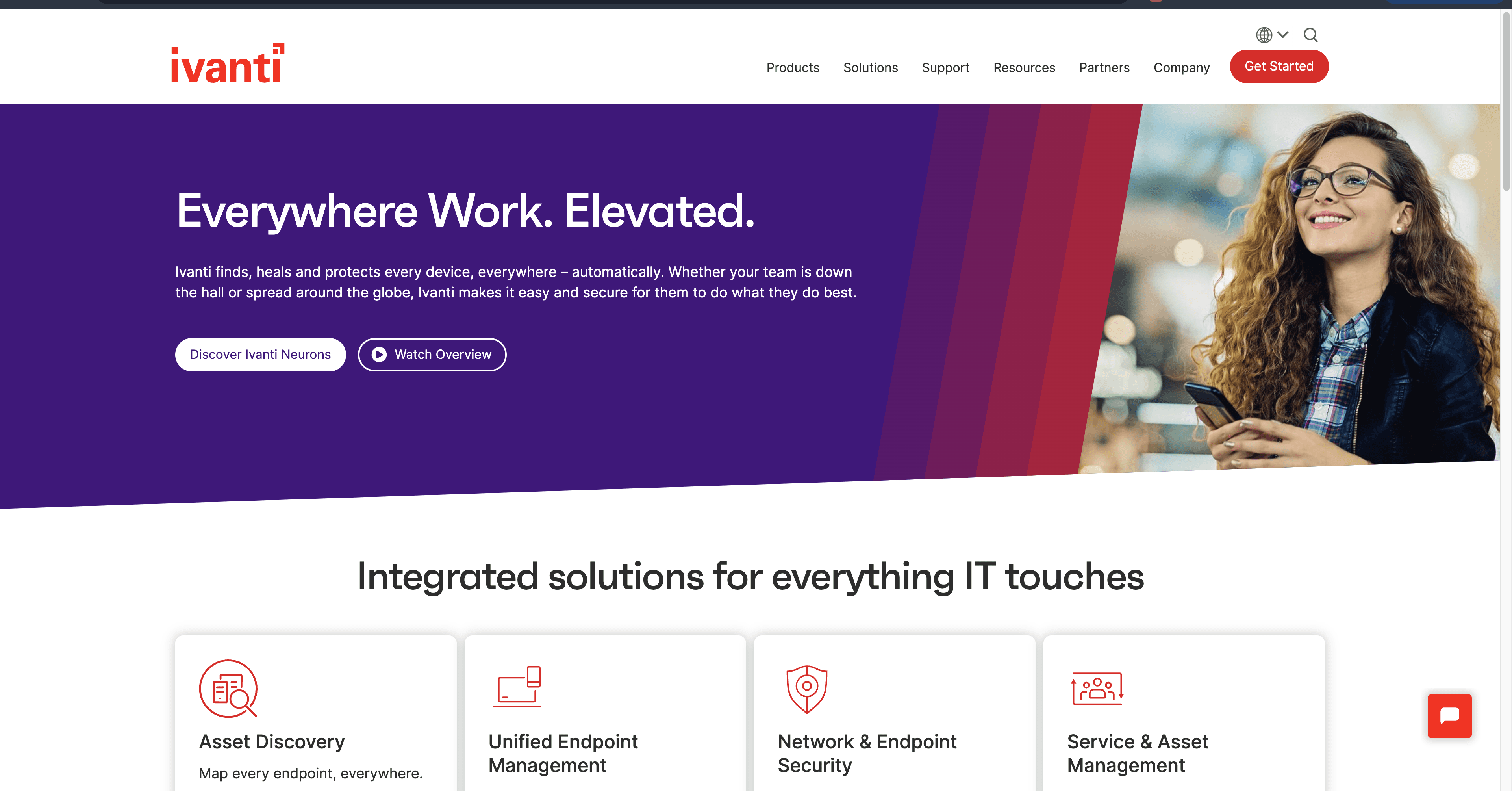
Ivanti provides IT solutions to manage and secure devices and services, focusing on asset discovery, endpoint management, and network security. Designed to enhance employee experiences and ensure security, Ivanti's products offer comprehensive and scalable solutions for the modern workplace.
Ivanti Pricing
ITSM Professional
ITSM Premium
ITSM Enterprise
ITSM Enterprise Premium
Secure UEM Professional
Secure UEM Professional Plus
Secure UEM Premium
Ivanti's pricing is not public. Contact their support for more info.
Ivanti Reviews
Ivanti has an overall rating of 4.3 out of 5 stars based on 87 reviews. Users praise its stability and security. Check out more of our reviews here!
Pros and Cons of Ivanti
Pros:
Comprehensive IT Solutions: Ivanti offers a wide range of integrated solutions for IT management, including asset discovery, endpoint management, network security, and service management.
Global Trust: Trusted by over 40,000 customers worldwide, indicating a strong reputation and reliability.
Focus on Security: Emphasizes secure Everywhere Work with scalable security strategies.
Cons:
Complexity: The wide range of products and solutions might be overwhelming for new users or smaller organizations.
Connection Issues: Users report occasional connection problems, which can disrupt workflow.
System Restart: Some users need to restart their systems after disconnecting, causing inconvenience.
5. IVPN
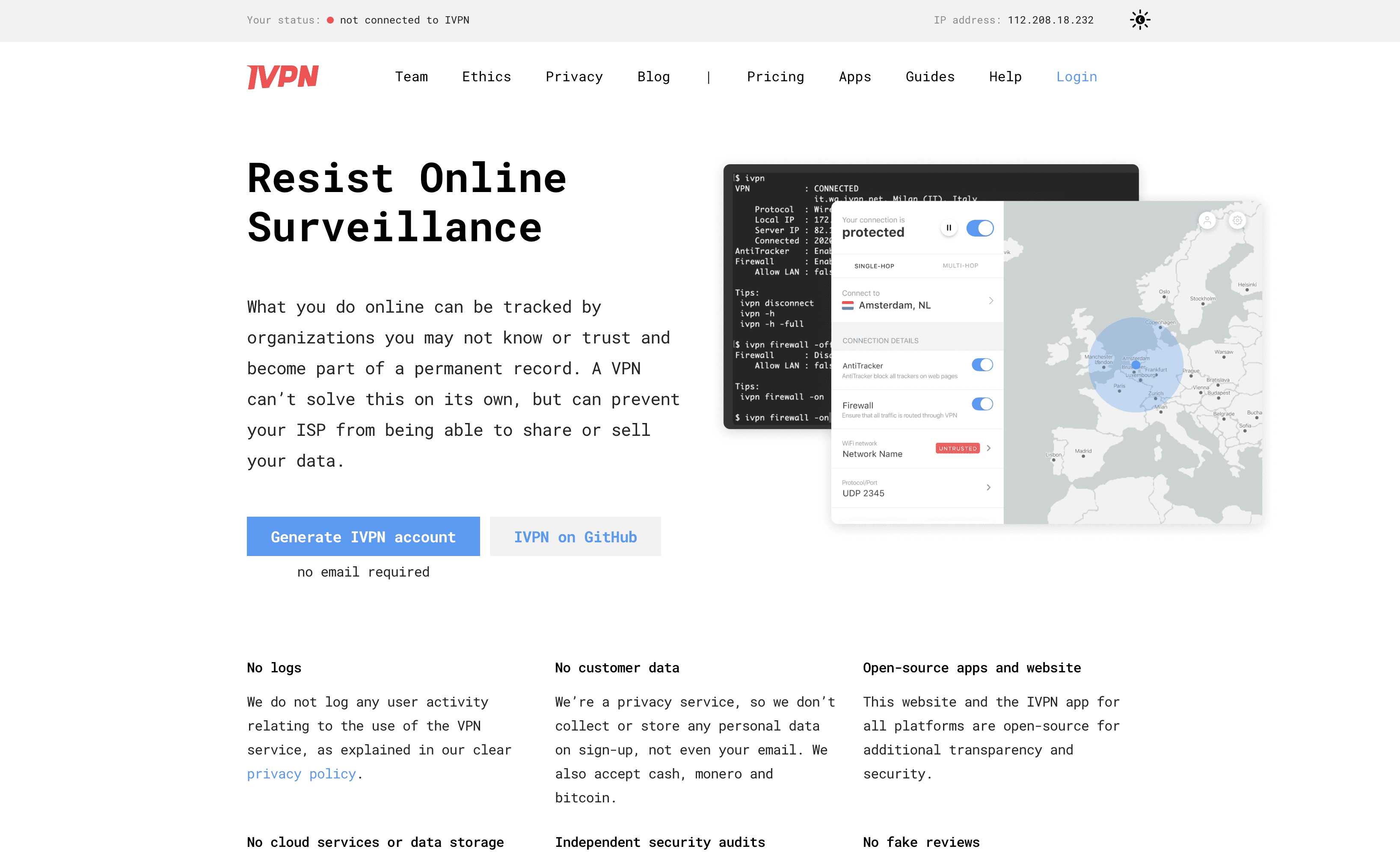
IVPN is a VPN service focused on privacy and security, designed to resist online surveillance. It offers features like no logs, open-source apps, and independent security audits. IVPN aims to protect users' online activities from being tracked by ISPs and other organizations, ensuring a secure browsing experience.
IVPN Pricing
IVPN Standard:
1 Week: $2
1 Month: $6
1 Year: $60
2 Years: $100
3 Years: $140
IVPN Pro:
1 Week: $4
1 Month: $10
1 Year: $100
2 Years: $160
3 Years: $220
IVPN Reviews
IVPN has an overall rating of 4.2 out of 5 stars based on 12 reviews. Users appreciate its high performance and serious focus on privacy. Check out more of our reviews here!
Pros and Cons of IVPN
Pros:
No Logs Policy: IVPN does not record any user activity, ensuring complete privacy.
Open-Source Transparency: All apps and the website are open-source, allowing for public scrutiny.
Independent Audits: Annual security audits by third parties verify the integrity and security of the service.
Cons:
Higher Cost: IVPN's subscription fees are higher compared to many other VPN services.
Manual Server Switching: Users must disconnect from one server before connecting to another, which can be inconvenient.
Limited Server Count: IVPN has fewer servers than some competitors, potentially affecting connection options.
6. Perimeter 81
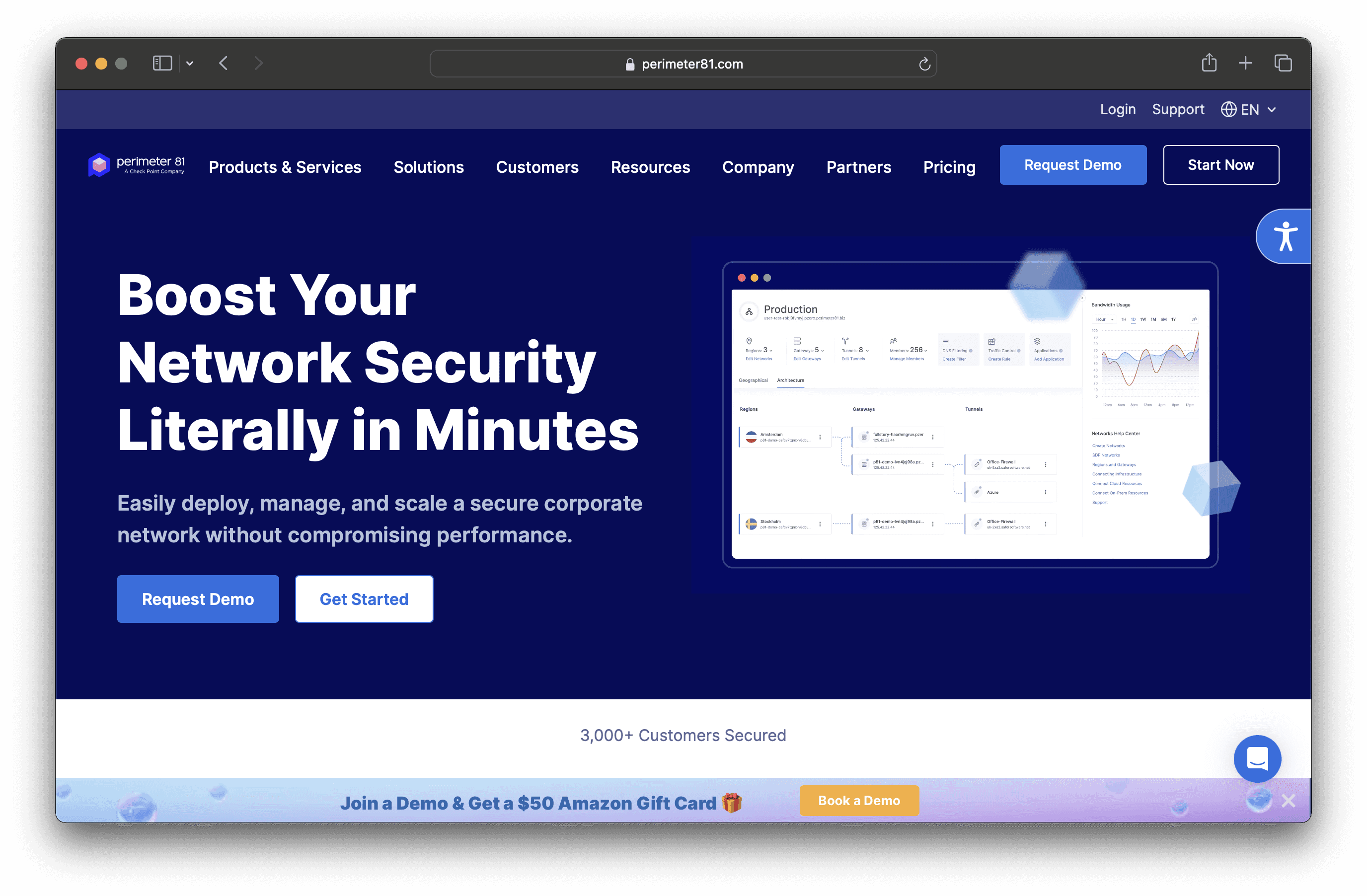
Perimeter 81 is a network security solution designed to simplify secure access for businesses. It offers a zero-trust security model, quick deployment, and easy management through a single platform. With a focus on scalability and user-friendliness, Perimeter 81 aims to provide robust protection without the need for hardware.
Perimeter 81 Pricing
Essentials: +$50/mo per gateway, minimum 10 users
Premium: +$50/mo per gateway, minimum 10 users
Premium Plus: +$50/mo per gateway, minimum 20 users
Enterprise: Custom pricing, minimum 50 users
Perimeter 81 Reviews
Perimeter 81 has an overall rating of 4.6 out of 5 stars based on 45 reviews. Users praise its ease of use and robust security. Check out more of our reviews here!
Pros and Cons of Perimeter 81
Pros:
Perimeter 81 offers robust protection with Zero Trust Network Access (ZTNA) and Secure Web Gateway (SWG), ensuring secure access to both private and internet resources.
Quick deployment is a standout feature, allowing businesses to secure their networks in under an hour without the need for hardware or extensive maintenance.
Its intuitive platform simplifies network management, making it accessible even for non-technical teams, enhancing overall user experience and compliance.
Cons:
While Perimeter 81 is feature-rich, some users may find the initial setup and integration with existing systems complex, requiring a learning curve.
Dependence on internet connectivity can be a drawback, as any disruption in internet service can affect the performance and availability of the security solution.
Although scalable, businesses with very specific or niche needs might find limitations in Perimeter 81's offerings, potentially requiring additional customization.
7. SaferVPN
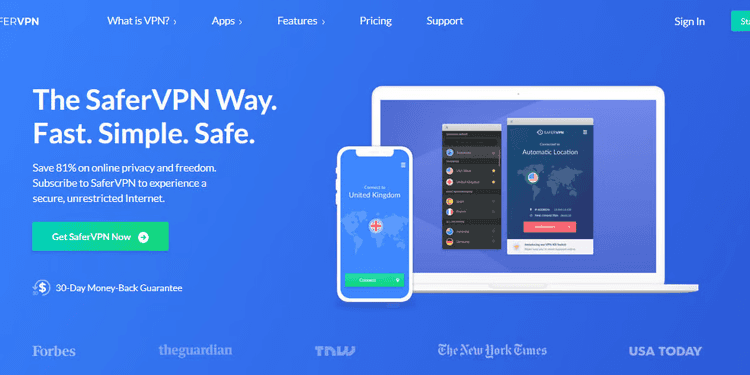
SaferVPN is a VPN service designed to enhance online privacy and security. It offers strong encryption, a no-logs policy, and user-friendly apps. With a focus on ease of use and reliable performance, SaferVPN aims to provide a secure browsing experience for users worldwide.
SaferVPN Pricing
1 Month Plan: $12.95 per month
1 Year Plan: $5.49 per month
3 Year Plan: $2.50 per month
SaferVPN Reviews
SaferVPN has an overall rating of 4.3 out of 5 stars based on 60 reviews. Users praise its ease of use and strong privacy protection. Check out more of our reviews here!
Pros and Cons of SaferVPN
Pros:
Ease of Use: Intuitive interface makes it simple for users to navigate and connect without technical expertise.
Customer Support: Responsive and helpful support team available to assist with any issues or questions.
Privacy Protection: Strong encryption and no-logs policy ensure user data remains private and secure.
Cons:
Slow Speed: Some users experience reduced internet speeds, affecting streaming and browsing performance.
Expensive: Higher subscription costs compared to other VPN services, which may not fit all budgets.
Limited Location Options: Fewer server locations available, potentially limiting access to certain regions.
8. Netbird
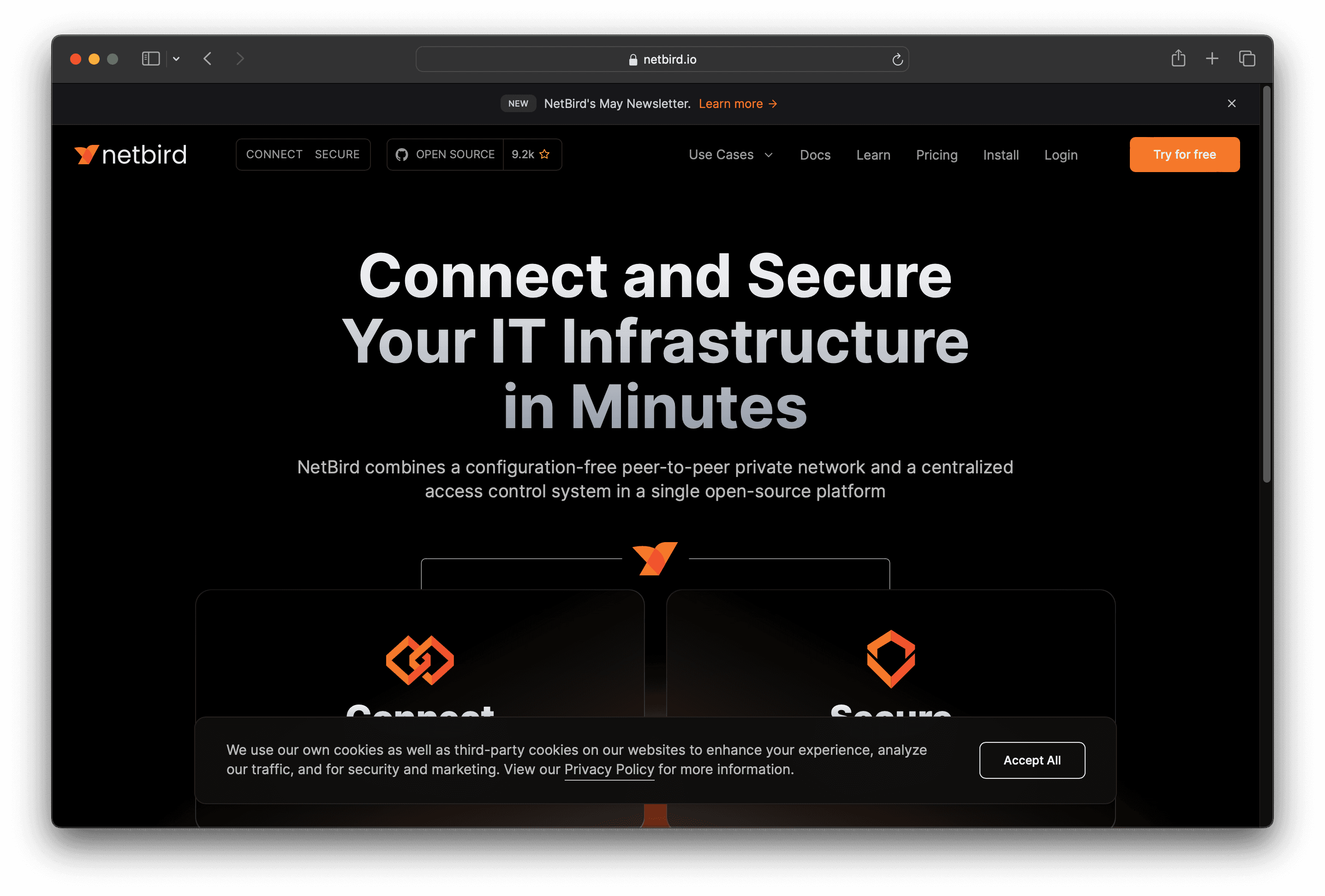
NetBird is an open-source platform designed to connect and secure IT infrastructure quickly and efficiently. It features a high-performance peer-to-peer network and enterprise-grade security. With a focus on ease of use and cost-effectiveness, NetBird aims to streamline network management for businesses of all sizes.
Netbird Pricing
Free: $0 per user/month
Team: $5 per user/month
Business: $12 per user/month
Enterprise: Custom pricing
MSPs: Custom pricing
Self-hosted NetBird: Free
Netbird Reviews
NetBird has an overall rating of 5.0 out of 5 stars based on 1 review. Users praise its ease of installation and open-source nature. Check out more of our reviews here!
Pros and Cons of Netbird
Pros:
Configuration-Free: NetBird offers a peer-to-peer private network that requires no configuration, simplifying setup and reducing deployment time.
Open-Source: The platform is open-source, allowing for transparency and community-driven improvements, ensuring robust and secure software.
High Performance: Built on WireGuard®, NetBird delivers high-speed, low-latency connections, enhancing overall network performance.
Cons:
Limited Reviews: With only one review, it's challenging to gauge the platform's performance and reliability comprehensively.
Potential Learning Curve: Users unfamiliar with peer-to-peer networks or WireGuard® may face a learning curve during initial setup.
Scalability Concerns: While suitable for many teams, very large enterprises might find limitations in scalability and customization options.
9. Namecheap VPN Service
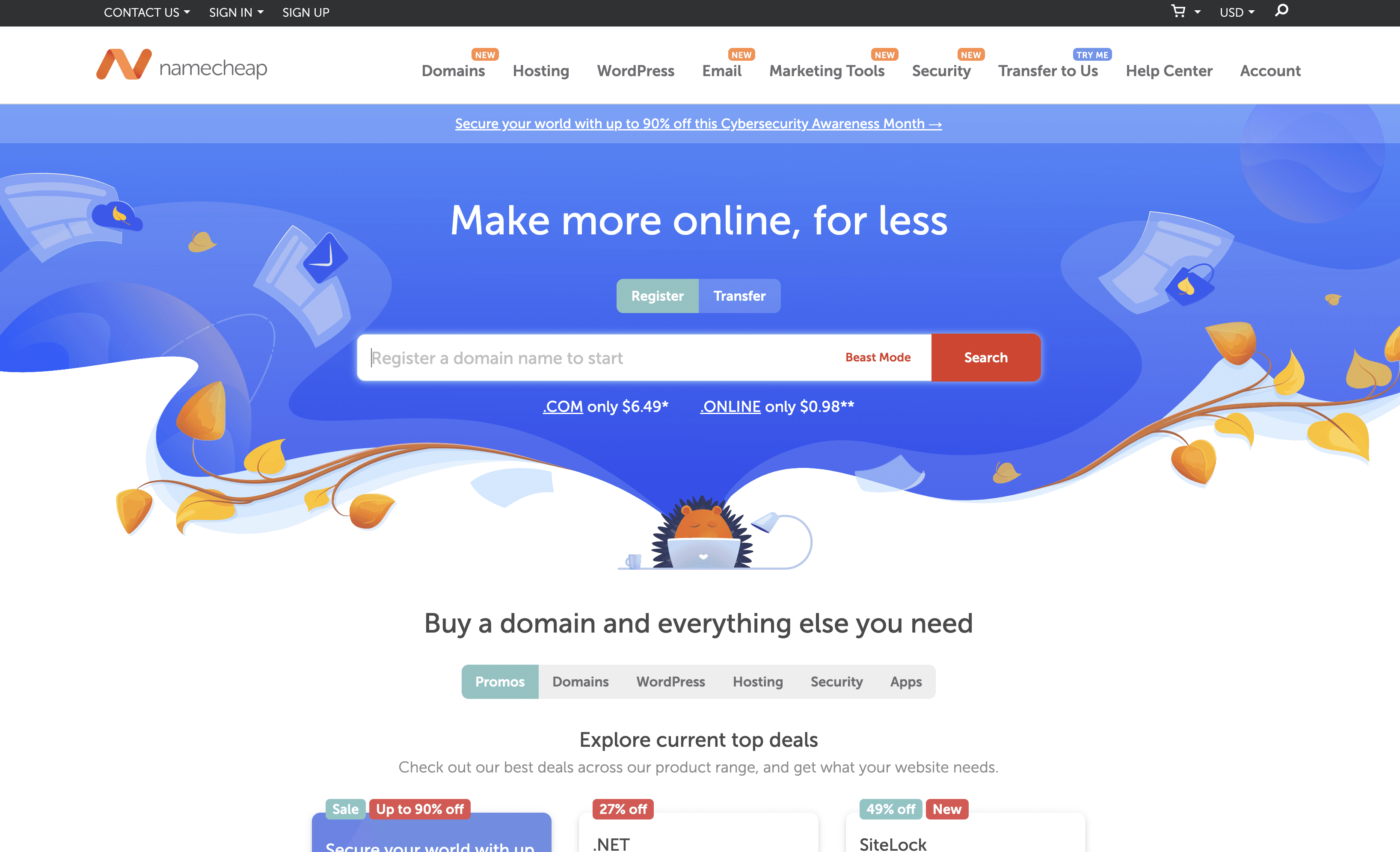
Namecheap VPN is a service designed to enhance online privacy and security. It offers strong encryption, a no-logs policy, and user-friendly apps. With a focus on ease of use and reliable performance, Namecheap VPN aims to provide a secure browsing experience for users worldwide.
Namecheap VPN Service Pricing
1 Month Plan: $12.95 per month
1 Year Plan: $5.49 per month
3 Year Plan: $2.50 per month
Namecheap VPN Service Reviews
Namecheap VPN Service has an overall rating of 4.4 out of 5 stars based on 11 reviews. Users appreciate its high speed and reliability. Check out more of our reviews here!
Pros and Cons of Namecheap VPN Service
Pros:
High Speed: Users appreciate the high internet speed, with minimal bandwidth reduction, ensuring smooth browsing and streaming.
Strong Security: The service is noted for its military-grade encryption, providing robust protection for user data.
Global Accessibility: Offers access to multiple locations worldwide, enhancing the ability to bypass geo-restrictions.
Cons:
Insufficient Guidance: Some users find the guidance and support for first-time users lacking, making initial setup challenging.
Server Instability: Occasional issues with server stability and connection failures can disrupt the user experience.
Limited Locations: The number of available server locations is limited, especially in certain countries, affecting accessibility.
10. UTunnel VPN
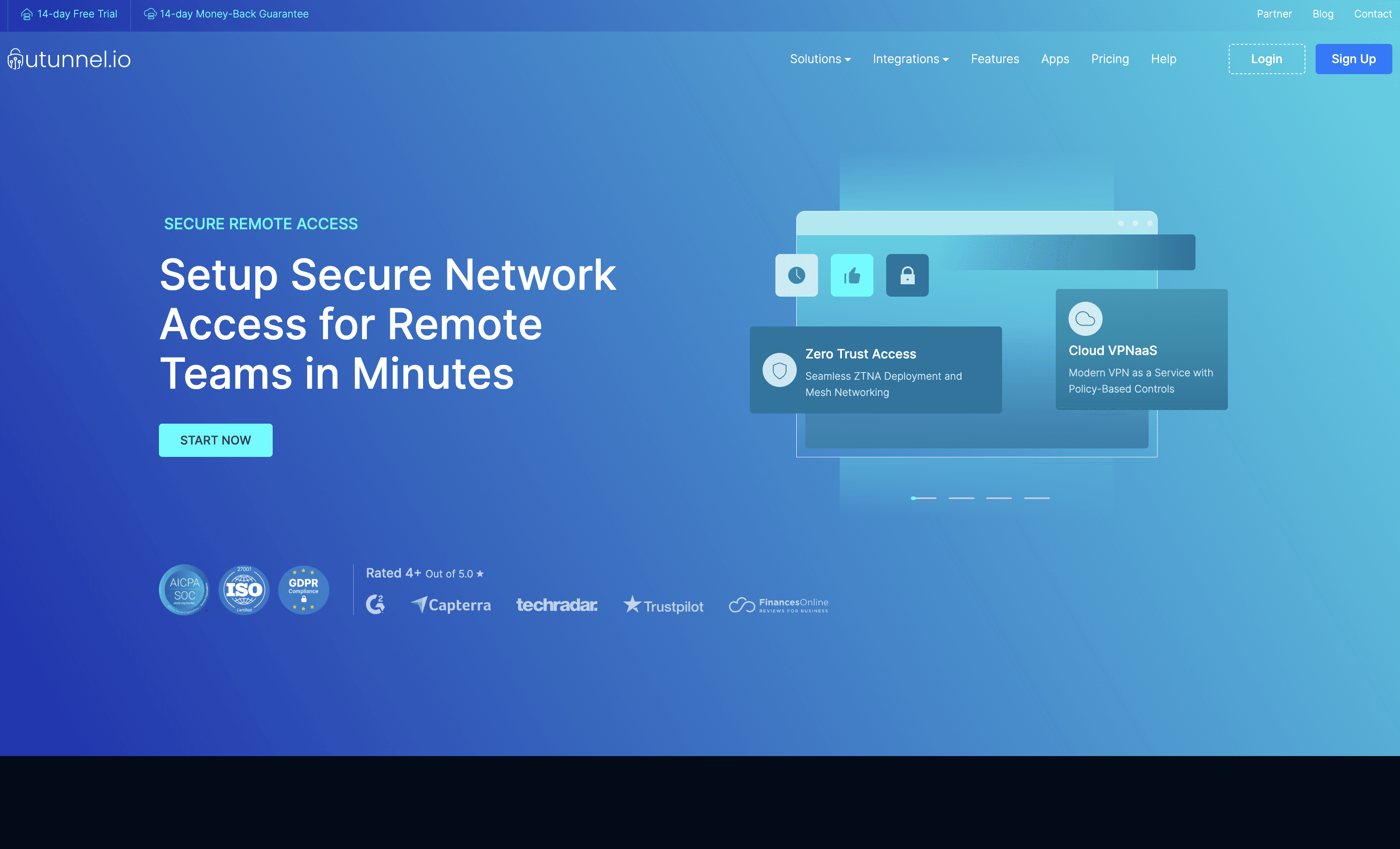
UTunnel VPN is a network security solution offering VPN and Zero Trust Network Access (ZTNA) for businesses. It focuses on ease of use, quick deployment, and centralized management, making it ideal for companies needing secure, scalable remote access without the need for costly hardware.
UTunnel VPN Pricing
Basic Plan: $6.00 per month
Standard Plan: $8.00 per month
Bespoke plans available based on volume
UTunnel VPN Reviews
UTunnel VPN has an overall rating of 4.8 out of 5 stars based on 23 reviews. Users praise its ease of setup and secure access. Check out more of our reviews here!
Pros and Cons of UTunnel VPN
Pros:
Easy Setup: Users with minimal technical knowledge can set up and manage remote access effortlessly.
Flexible Deployment: Supports both cloud and on-premise VPN server deployment, catering to diverse business needs.
Zero Trust Access: Provides secure, policy-based access to business applications and resources, enhancing security.
Cons:
Dependency on Internet: Performance and reliability are dependent on the quality of the internet connection.
Complexity for Non-Technical Users: Some non-technical users might find initial setup and configuration challenging without support.
Cost for Advanced Features: Advanced features and higher-tier plans might be more expensive for some small businesses.
Looking to secure your technical infrastructure?
Twingate offers granular access controls and deployment automations to protect your VPC environment. By leveraging Zero Trust security tools, Twingate ensures that private resources and internet traffic remain secure in the modern work landscape. Try Twingate for Free today!
Rapidly implement a modern Zero Trust network that is more secure and maintainable than VPNs.
The Best 10 Alternatives to Azure VPN Gateway (+ Pricing & Reviews)
Twingate Team
•
•
Jul 27, 2024

Azure VPN Gateway allows secure connections to the cloud, enabling users to connect their on-premises networks to Azure. While it offers robust features, it might not be the choice for everyone. This article explores the benefits and limitations of using Azure VPN Gateway for secure cloud connections.

10 Alternatives to Azure VPN Gateway
1. Twingate

Twingate is a network security solution designed to replace traditional VPNs for remote access, offering a zero-trust security model and seamless deployment alongside existing infrastructure. With a focus on ease of use and scalability, Twingate aims to provide a secure and maintainable solution for businesses of all sizes.
Twingate Pricing
Starter: Free
Teams: $6 per user/month
Business: $12 per user/month
Enterprise: Custom pricing
Twingate Reviews
Twingate has an overall rating of 4.7 out of 5 stars based on 63 reviews. Users praise its ease of setup, high security, and excellent performance. Check out more of our reviews here!
Pros and Cons of Twingate
Pros:
Hardware Free: Eliminates challenging deployments and resource-intensive maintenance with software-based ZTNA.
Zero Trust Security: Prevents lateral network traffic, eliminates open inbound ports, and implements the principle of least privilege across the entire network.
Performant & Productive: Reduces IT support tickets and improves productivity for end users with best-in-class speed, reliability, and user experience.
Cons:
Initial Setup Complexity: While generally easy to set up, some users may find the initial configuration and integration with existing systems complex.
Learning Curve: There may be a learning curve for users unfamiliar with Zero Trust principles and ZTNA solutions.
Dependency on Internet: As a cloud-based solution, Twingate's performance and availability are dependent on internet connectivity.
2. CyberGhost

CyberGhost VPN is a service designed to enhance online privacy and security. It offers strong encryption, a no-logs policy, and access to a large server fleet. With features like split tunneling and dedicated IPs, CyberGhost aims to provide a secure and user-friendly VPN experience for all users.
CyberGhost Pricing
1 Month Plan: $12.99 per month
28 Month Plan: $2.03 per month
6 Month Plan: $6.99 per month
CyberGhost Reviews
CyberGhost has an overall rating of 4.5 out of 5 stars based on 20 reviews. Users praise its stability and security. Check out more of our reviews here!
Pros and Cons ofCyberGhost
Pros:
Complete Privacy: Connect up to 7 devices simultaneously with one subscription, ensuring all your gadgets are protected.
No Logs Policy: CyberGhost guarantees no tracking, sharing, or selling of user data, maintaining your anonymity.
Strong Encryption: Uses industry-leading encryption to hide your location and internet traffic from prying eyes.
Cons:
Access Issues: Some users report occasional difficulties accessing certain websites or services.
Limited Location Options: Despite a large server fleet, some regions may have fewer server choices.
Potential Speed Reduction: While generally fast, VPNs can sometimes slow down your internet connection.
3. Todyl

Todyl is a cybersecurity solution offering a modular and scalable approach to security. It consolidates multiple security capabilities into a single-agent platform, making deployment and management seamless. Todyl aims to provide comprehensive protection tailored to the specific needs of businesses, ensuring robust and adaptable security measures.
Todyl Pricing
Todyl's pricing is not public. Contact their support for more info.
Todyl Reviews
Todyl has an overall rating of 4.7 out of 5 stars based on 41 reviews. Users appreciate its comprehensive and integrated nature. Check out more of our reviews here!
Pros and Cons of Todyl
Pros:
Comprehensive and Customizable: Todyl offers a consolidated, customizable approach to cybersecurity, ensuring tailored protection for diverse business needs.
Single-Agent Platform: Streamlines deployments and optimizes operational overhead, reducing complexity and enhancing efficiency.
Modular Approach: Each module can be deployed independently, providing flexibility and scalability to meet specific security requirements.
Cons:
Complexity: The modular and customizable nature might require a steep learning curve for some users, potentially delaying full implementation.
Dependence on Single Platform: Relying on a single platform might pose risks if there are any platform-wide issues, affecting overall security.
Scalability Concerns: While scalable, businesses with very specific or niche needs might find limitations in Todyl's offerings.
4. Ivanti

Ivanti provides IT solutions to manage and secure devices and services, focusing on asset discovery, endpoint management, and network security. Designed to enhance employee experiences and ensure security, Ivanti's products offer comprehensive and scalable solutions for the modern workplace.
Ivanti Pricing
ITSM Professional
ITSM Premium
ITSM Enterprise
ITSM Enterprise Premium
Secure UEM Professional
Secure UEM Professional Plus
Secure UEM Premium
Ivanti's pricing is not public. Contact their support for more info.
Ivanti Reviews
Ivanti has an overall rating of 4.3 out of 5 stars based on 87 reviews. Users praise its stability and security. Check out more of our reviews here!
Pros and Cons of Ivanti
Pros:
Comprehensive IT Solutions: Ivanti offers a wide range of integrated solutions for IT management, including asset discovery, endpoint management, network security, and service management.
Global Trust: Trusted by over 40,000 customers worldwide, indicating a strong reputation and reliability.
Focus on Security: Emphasizes secure Everywhere Work with scalable security strategies.
Cons:
Complexity: The wide range of products and solutions might be overwhelming for new users or smaller organizations.
Connection Issues: Users report occasional connection problems, which can disrupt workflow.
System Restart: Some users need to restart their systems after disconnecting, causing inconvenience.
5. IVPN

IVPN is a VPN service focused on privacy and security, designed to resist online surveillance. It offers features like no logs, open-source apps, and independent security audits. IVPN aims to protect users' online activities from being tracked by ISPs and other organizations, ensuring a secure browsing experience.
IVPN Pricing
IVPN Standard:
1 Week: $2
1 Month: $6
1 Year: $60
2 Years: $100
3 Years: $140
IVPN Pro:
1 Week: $4
1 Month: $10
1 Year: $100
2 Years: $160
3 Years: $220
IVPN Reviews
IVPN has an overall rating of 4.2 out of 5 stars based on 12 reviews. Users appreciate its high performance and serious focus on privacy. Check out more of our reviews here!
Pros and Cons of IVPN
Pros:
No Logs Policy: IVPN does not record any user activity, ensuring complete privacy.
Open-Source Transparency: All apps and the website are open-source, allowing for public scrutiny.
Independent Audits: Annual security audits by third parties verify the integrity and security of the service.
Cons:
Higher Cost: IVPN's subscription fees are higher compared to many other VPN services.
Manual Server Switching: Users must disconnect from one server before connecting to another, which can be inconvenient.
Limited Server Count: IVPN has fewer servers than some competitors, potentially affecting connection options.
6. Perimeter 81

Perimeter 81 is a network security solution designed to simplify secure access for businesses. It offers a zero-trust security model, quick deployment, and easy management through a single platform. With a focus on scalability and user-friendliness, Perimeter 81 aims to provide robust protection without the need for hardware.
Perimeter 81 Pricing
Essentials: +$50/mo per gateway, minimum 10 users
Premium: +$50/mo per gateway, minimum 10 users
Premium Plus: +$50/mo per gateway, minimum 20 users
Enterprise: Custom pricing, minimum 50 users
Perimeter 81 Reviews
Perimeter 81 has an overall rating of 4.6 out of 5 stars based on 45 reviews. Users praise its ease of use and robust security. Check out more of our reviews here!
Pros and Cons of Perimeter 81
Pros:
Perimeter 81 offers robust protection with Zero Trust Network Access (ZTNA) and Secure Web Gateway (SWG), ensuring secure access to both private and internet resources.
Quick deployment is a standout feature, allowing businesses to secure their networks in under an hour without the need for hardware or extensive maintenance.
Its intuitive platform simplifies network management, making it accessible even for non-technical teams, enhancing overall user experience and compliance.
Cons:
While Perimeter 81 is feature-rich, some users may find the initial setup and integration with existing systems complex, requiring a learning curve.
Dependence on internet connectivity can be a drawback, as any disruption in internet service can affect the performance and availability of the security solution.
Although scalable, businesses with very specific or niche needs might find limitations in Perimeter 81's offerings, potentially requiring additional customization.
7. SaferVPN

SaferVPN is a VPN service designed to enhance online privacy and security. It offers strong encryption, a no-logs policy, and user-friendly apps. With a focus on ease of use and reliable performance, SaferVPN aims to provide a secure browsing experience for users worldwide.
SaferVPN Pricing
1 Month Plan: $12.95 per month
1 Year Plan: $5.49 per month
3 Year Plan: $2.50 per month
SaferVPN Reviews
SaferVPN has an overall rating of 4.3 out of 5 stars based on 60 reviews. Users praise its ease of use and strong privacy protection. Check out more of our reviews here!
Pros and Cons of SaferVPN
Pros:
Ease of Use: Intuitive interface makes it simple for users to navigate and connect without technical expertise.
Customer Support: Responsive and helpful support team available to assist with any issues or questions.
Privacy Protection: Strong encryption and no-logs policy ensure user data remains private and secure.
Cons:
Slow Speed: Some users experience reduced internet speeds, affecting streaming and browsing performance.
Expensive: Higher subscription costs compared to other VPN services, which may not fit all budgets.
Limited Location Options: Fewer server locations available, potentially limiting access to certain regions.
8. Netbird

NetBird is an open-source platform designed to connect and secure IT infrastructure quickly and efficiently. It features a high-performance peer-to-peer network and enterprise-grade security. With a focus on ease of use and cost-effectiveness, NetBird aims to streamline network management for businesses of all sizes.
Netbird Pricing
Free: $0 per user/month
Team: $5 per user/month
Business: $12 per user/month
Enterprise: Custom pricing
MSPs: Custom pricing
Self-hosted NetBird: Free
Netbird Reviews
NetBird has an overall rating of 5.0 out of 5 stars based on 1 review. Users praise its ease of installation and open-source nature. Check out more of our reviews here!
Pros and Cons of Netbird
Pros:
Configuration-Free: NetBird offers a peer-to-peer private network that requires no configuration, simplifying setup and reducing deployment time.
Open-Source: The platform is open-source, allowing for transparency and community-driven improvements, ensuring robust and secure software.
High Performance: Built on WireGuard®, NetBird delivers high-speed, low-latency connections, enhancing overall network performance.
Cons:
Limited Reviews: With only one review, it's challenging to gauge the platform's performance and reliability comprehensively.
Potential Learning Curve: Users unfamiliar with peer-to-peer networks or WireGuard® may face a learning curve during initial setup.
Scalability Concerns: While suitable for many teams, very large enterprises might find limitations in scalability and customization options.
9. Namecheap VPN Service

Namecheap VPN is a service designed to enhance online privacy and security. It offers strong encryption, a no-logs policy, and user-friendly apps. With a focus on ease of use and reliable performance, Namecheap VPN aims to provide a secure browsing experience for users worldwide.
Namecheap VPN Service Pricing
1 Month Plan: $12.95 per month
1 Year Plan: $5.49 per month
3 Year Plan: $2.50 per month
Namecheap VPN Service Reviews
Namecheap VPN Service has an overall rating of 4.4 out of 5 stars based on 11 reviews. Users appreciate its high speed and reliability. Check out more of our reviews here!
Pros and Cons of Namecheap VPN Service
Pros:
High Speed: Users appreciate the high internet speed, with minimal bandwidth reduction, ensuring smooth browsing and streaming.
Strong Security: The service is noted for its military-grade encryption, providing robust protection for user data.
Global Accessibility: Offers access to multiple locations worldwide, enhancing the ability to bypass geo-restrictions.
Cons:
Insufficient Guidance: Some users find the guidance and support for first-time users lacking, making initial setup challenging.
Server Instability: Occasional issues with server stability and connection failures can disrupt the user experience.
Limited Locations: The number of available server locations is limited, especially in certain countries, affecting accessibility.
10. UTunnel VPN

UTunnel VPN is a network security solution offering VPN and Zero Trust Network Access (ZTNA) for businesses. It focuses on ease of use, quick deployment, and centralized management, making it ideal for companies needing secure, scalable remote access without the need for costly hardware.
UTunnel VPN Pricing
Basic Plan: $6.00 per month
Standard Plan: $8.00 per month
Bespoke plans available based on volume
UTunnel VPN Reviews
UTunnel VPN has an overall rating of 4.8 out of 5 stars based on 23 reviews. Users praise its ease of setup and secure access. Check out more of our reviews here!
Pros and Cons of UTunnel VPN
Pros:
Easy Setup: Users with minimal technical knowledge can set up and manage remote access effortlessly.
Flexible Deployment: Supports both cloud and on-premise VPN server deployment, catering to diverse business needs.
Zero Trust Access: Provides secure, policy-based access to business applications and resources, enhancing security.
Cons:
Dependency on Internet: Performance and reliability are dependent on the quality of the internet connection.
Complexity for Non-Technical Users: Some non-technical users might find initial setup and configuration challenging without support.
Cost for Advanced Features: Advanced features and higher-tier plans might be more expensive for some small businesses.
Looking to secure your technical infrastructure?
Twingate offers granular access controls and deployment automations to protect your VPC environment. By leveraging Zero Trust security tools, Twingate ensures that private resources and internet traffic remain secure in the modern work landscape. Try Twingate for Free today!
Rapidly implement a modern Zero Trust network that is more secure and maintainable than VPNs.
The Best 10 Alternatives to Azure VPN Gateway (+ Pricing & Reviews)
Twingate Team
•
•
Jul 27, 2024

Azure VPN Gateway allows secure connections to the cloud, enabling users to connect their on-premises networks to Azure. While it offers robust features, it might not be the choice for everyone. This article explores the benefits and limitations of using Azure VPN Gateway for secure cloud connections.

10 Alternatives to Azure VPN Gateway
1. Twingate

Twingate is a network security solution designed to replace traditional VPNs for remote access, offering a zero-trust security model and seamless deployment alongside existing infrastructure. With a focus on ease of use and scalability, Twingate aims to provide a secure and maintainable solution for businesses of all sizes.
Twingate Pricing
Starter: Free
Teams: $6 per user/month
Business: $12 per user/month
Enterprise: Custom pricing
Twingate Reviews
Twingate has an overall rating of 4.7 out of 5 stars based on 63 reviews. Users praise its ease of setup, high security, and excellent performance. Check out more of our reviews here!
Pros and Cons of Twingate
Pros:
Hardware Free: Eliminates challenging deployments and resource-intensive maintenance with software-based ZTNA.
Zero Trust Security: Prevents lateral network traffic, eliminates open inbound ports, and implements the principle of least privilege across the entire network.
Performant & Productive: Reduces IT support tickets and improves productivity for end users with best-in-class speed, reliability, and user experience.
Cons:
Initial Setup Complexity: While generally easy to set up, some users may find the initial configuration and integration with existing systems complex.
Learning Curve: There may be a learning curve for users unfamiliar with Zero Trust principles and ZTNA solutions.
Dependency on Internet: As a cloud-based solution, Twingate's performance and availability are dependent on internet connectivity.
2. CyberGhost

CyberGhost VPN is a service designed to enhance online privacy and security. It offers strong encryption, a no-logs policy, and access to a large server fleet. With features like split tunneling and dedicated IPs, CyberGhost aims to provide a secure and user-friendly VPN experience for all users.
CyberGhost Pricing
1 Month Plan: $12.99 per month
28 Month Plan: $2.03 per month
6 Month Plan: $6.99 per month
CyberGhost Reviews
CyberGhost has an overall rating of 4.5 out of 5 stars based on 20 reviews. Users praise its stability and security. Check out more of our reviews here!
Pros and Cons ofCyberGhost
Pros:
Complete Privacy: Connect up to 7 devices simultaneously with one subscription, ensuring all your gadgets are protected.
No Logs Policy: CyberGhost guarantees no tracking, sharing, or selling of user data, maintaining your anonymity.
Strong Encryption: Uses industry-leading encryption to hide your location and internet traffic from prying eyes.
Cons:
Access Issues: Some users report occasional difficulties accessing certain websites or services.
Limited Location Options: Despite a large server fleet, some regions may have fewer server choices.
Potential Speed Reduction: While generally fast, VPNs can sometimes slow down your internet connection.
3. Todyl

Todyl is a cybersecurity solution offering a modular and scalable approach to security. It consolidates multiple security capabilities into a single-agent platform, making deployment and management seamless. Todyl aims to provide comprehensive protection tailored to the specific needs of businesses, ensuring robust and adaptable security measures.
Todyl Pricing
Todyl's pricing is not public. Contact their support for more info.
Todyl Reviews
Todyl has an overall rating of 4.7 out of 5 stars based on 41 reviews. Users appreciate its comprehensive and integrated nature. Check out more of our reviews here!
Pros and Cons of Todyl
Pros:
Comprehensive and Customizable: Todyl offers a consolidated, customizable approach to cybersecurity, ensuring tailored protection for diverse business needs.
Single-Agent Platform: Streamlines deployments and optimizes operational overhead, reducing complexity and enhancing efficiency.
Modular Approach: Each module can be deployed independently, providing flexibility and scalability to meet specific security requirements.
Cons:
Complexity: The modular and customizable nature might require a steep learning curve for some users, potentially delaying full implementation.
Dependence on Single Platform: Relying on a single platform might pose risks if there are any platform-wide issues, affecting overall security.
Scalability Concerns: While scalable, businesses with very specific or niche needs might find limitations in Todyl's offerings.
4. Ivanti

Ivanti provides IT solutions to manage and secure devices and services, focusing on asset discovery, endpoint management, and network security. Designed to enhance employee experiences and ensure security, Ivanti's products offer comprehensive and scalable solutions for the modern workplace.
Ivanti Pricing
ITSM Professional
ITSM Premium
ITSM Enterprise
ITSM Enterprise Premium
Secure UEM Professional
Secure UEM Professional Plus
Secure UEM Premium
Ivanti's pricing is not public. Contact their support for more info.
Ivanti Reviews
Ivanti has an overall rating of 4.3 out of 5 stars based on 87 reviews. Users praise its stability and security. Check out more of our reviews here!
Pros and Cons of Ivanti
Pros:
Comprehensive IT Solutions: Ivanti offers a wide range of integrated solutions for IT management, including asset discovery, endpoint management, network security, and service management.
Global Trust: Trusted by over 40,000 customers worldwide, indicating a strong reputation and reliability.
Focus on Security: Emphasizes secure Everywhere Work with scalable security strategies.
Cons:
Complexity: The wide range of products and solutions might be overwhelming for new users or smaller organizations.
Connection Issues: Users report occasional connection problems, which can disrupt workflow.
System Restart: Some users need to restart their systems after disconnecting, causing inconvenience.
5. IVPN

IVPN is a VPN service focused on privacy and security, designed to resist online surveillance. It offers features like no logs, open-source apps, and independent security audits. IVPN aims to protect users' online activities from being tracked by ISPs and other organizations, ensuring a secure browsing experience.
IVPN Pricing
IVPN Standard:
1 Week: $2
1 Month: $6
1 Year: $60
2 Years: $100
3 Years: $140
IVPN Pro:
1 Week: $4
1 Month: $10
1 Year: $100
2 Years: $160
3 Years: $220
IVPN Reviews
IVPN has an overall rating of 4.2 out of 5 stars based on 12 reviews. Users appreciate its high performance and serious focus on privacy. Check out more of our reviews here!
Pros and Cons of IVPN
Pros:
No Logs Policy: IVPN does not record any user activity, ensuring complete privacy.
Open-Source Transparency: All apps and the website are open-source, allowing for public scrutiny.
Independent Audits: Annual security audits by third parties verify the integrity and security of the service.
Cons:
Higher Cost: IVPN's subscription fees are higher compared to many other VPN services.
Manual Server Switching: Users must disconnect from one server before connecting to another, which can be inconvenient.
Limited Server Count: IVPN has fewer servers than some competitors, potentially affecting connection options.
6. Perimeter 81

Perimeter 81 is a network security solution designed to simplify secure access for businesses. It offers a zero-trust security model, quick deployment, and easy management through a single platform. With a focus on scalability and user-friendliness, Perimeter 81 aims to provide robust protection without the need for hardware.
Perimeter 81 Pricing
Essentials: +$50/mo per gateway, minimum 10 users
Premium: +$50/mo per gateway, minimum 10 users
Premium Plus: +$50/mo per gateway, minimum 20 users
Enterprise: Custom pricing, minimum 50 users
Perimeter 81 Reviews
Perimeter 81 has an overall rating of 4.6 out of 5 stars based on 45 reviews. Users praise its ease of use and robust security. Check out more of our reviews here!
Pros and Cons of Perimeter 81
Pros:
Perimeter 81 offers robust protection with Zero Trust Network Access (ZTNA) and Secure Web Gateway (SWG), ensuring secure access to both private and internet resources.
Quick deployment is a standout feature, allowing businesses to secure their networks in under an hour without the need for hardware or extensive maintenance.
Its intuitive platform simplifies network management, making it accessible even for non-technical teams, enhancing overall user experience and compliance.
Cons:
While Perimeter 81 is feature-rich, some users may find the initial setup and integration with existing systems complex, requiring a learning curve.
Dependence on internet connectivity can be a drawback, as any disruption in internet service can affect the performance and availability of the security solution.
Although scalable, businesses with very specific or niche needs might find limitations in Perimeter 81's offerings, potentially requiring additional customization.
7. SaferVPN

SaferVPN is a VPN service designed to enhance online privacy and security. It offers strong encryption, a no-logs policy, and user-friendly apps. With a focus on ease of use and reliable performance, SaferVPN aims to provide a secure browsing experience for users worldwide.
SaferVPN Pricing
1 Month Plan: $12.95 per month
1 Year Plan: $5.49 per month
3 Year Plan: $2.50 per month
SaferVPN Reviews
SaferVPN has an overall rating of 4.3 out of 5 stars based on 60 reviews. Users praise its ease of use and strong privacy protection. Check out more of our reviews here!
Pros and Cons of SaferVPN
Pros:
Ease of Use: Intuitive interface makes it simple for users to navigate and connect without technical expertise.
Customer Support: Responsive and helpful support team available to assist with any issues or questions.
Privacy Protection: Strong encryption and no-logs policy ensure user data remains private and secure.
Cons:
Slow Speed: Some users experience reduced internet speeds, affecting streaming and browsing performance.
Expensive: Higher subscription costs compared to other VPN services, which may not fit all budgets.
Limited Location Options: Fewer server locations available, potentially limiting access to certain regions.
8. Netbird

NetBird is an open-source platform designed to connect and secure IT infrastructure quickly and efficiently. It features a high-performance peer-to-peer network and enterprise-grade security. With a focus on ease of use and cost-effectiveness, NetBird aims to streamline network management for businesses of all sizes.
Netbird Pricing
Free: $0 per user/month
Team: $5 per user/month
Business: $12 per user/month
Enterprise: Custom pricing
MSPs: Custom pricing
Self-hosted NetBird: Free
Netbird Reviews
NetBird has an overall rating of 5.0 out of 5 stars based on 1 review. Users praise its ease of installation and open-source nature. Check out more of our reviews here!
Pros and Cons of Netbird
Pros:
Configuration-Free: NetBird offers a peer-to-peer private network that requires no configuration, simplifying setup and reducing deployment time.
Open-Source: The platform is open-source, allowing for transparency and community-driven improvements, ensuring robust and secure software.
High Performance: Built on WireGuard®, NetBird delivers high-speed, low-latency connections, enhancing overall network performance.
Cons:
Limited Reviews: With only one review, it's challenging to gauge the platform's performance and reliability comprehensively.
Potential Learning Curve: Users unfamiliar with peer-to-peer networks or WireGuard® may face a learning curve during initial setup.
Scalability Concerns: While suitable for many teams, very large enterprises might find limitations in scalability and customization options.
9. Namecheap VPN Service

Namecheap VPN is a service designed to enhance online privacy and security. It offers strong encryption, a no-logs policy, and user-friendly apps. With a focus on ease of use and reliable performance, Namecheap VPN aims to provide a secure browsing experience for users worldwide.
Namecheap VPN Service Pricing
1 Month Plan: $12.95 per month
1 Year Plan: $5.49 per month
3 Year Plan: $2.50 per month
Namecheap VPN Service Reviews
Namecheap VPN Service has an overall rating of 4.4 out of 5 stars based on 11 reviews. Users appreciate its high speed and reliability. Check out more of our reviews here!
Pros and Cons of Namecheap VPN Service
Pros:
High Speed: Users appreciate the high internet speed, with minimal bandwidth reduction, ensuring smooth browsing and streaming.
Strong Security: The service is noted for its military-grade encryption, providing robust protection for user data.
Global Accessibility: Offers access to multiple locations worldwide, enhancing the ability to bypass geo-restrictions.
Cons:
Insufficient Guidance: Some users find the guidance and support for first-time users lacking, making initial setup challenging.
Server Instability: Occasional issues with server stability and connection failures can disrupt the user experience.
Limited Locations: The number of available server locations is limited, especially in certain countries, affecting accessibility.
10. UTunnel VPN

UTunnel VPN is a network security solution offering VPN and Zero Trust Network Access (ZTNA) for businesses. It focuses on ease of use, quick deployment, and centralized management, making it ideal for companies needing secure, scalable remote access without the need for costly hardware.
UTunnel VPN Pricing
Basic Plan: $6.00 per month
Standard Plan: $8.00 per month
Bespoke plans available based on volume
UTunnel VPN Reviews
UTunnel VPN has an overall rating of 4.8 out of 5 stars based on 23 reviews. Users praise its ease of setup and secure access. Check out more of our reviews here!
Pros and Cons of UTunnel VPN
Pros:
Easy Setup: Users with minimal technical knowledge can set up and manage remote access effortlessly.
Flexible Deployment: Supports both cloud and on-premise VPN server deployment, catering to diverse business needs.
Zero Trust Access: Provides secure, policy-based access to business applications and resources, enhancing security.
Cons:
Dependency on Internet: Performance and reliability are dependent on the quality of the internet connection.
Complexity for Non-Technical Users: Some non-technical users might find initial setup and configuration challenging without support.
Cost for Advanced Features: Advanced features and higher-tier plans might be more expensive for some small businesses.
Looking to secure your technical infrastructure?
Twingate offers granular access controls and deployment automations to protect your VPC environment. By leveraging Zero Trust security tools, Twingate ensures that private resources and internet traffic remain secure in the modern work landscape. Try Twingate for Free today!
Solutions
Solutions
The VPN replacement your workforce will love.
Solutions